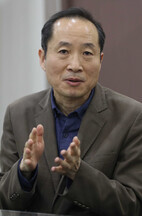hankyoreh
Links to other country sites 다른 나라 사이트 링크
[Column] How can S. Korea survive the US-China trade war?

It’s more important than ever for Seoul to assert its national interest and avoid taking sides in a battle of hegemons
Two years ago, I visited the headquarters of ByteDance, the Chinese company that owns TikTok, a video sharing app that has become wildly popular with younger users. The corridors of the office building in Zhongguancun, a technology hub in Beijing, were bustling with casually dressed youngsters. Just six years after its founding, the company had 20,000 employees; more than 80% were reportedly in their 20s.
Youthful energy rippled from the ByteDance headquarters. There was a round conference room in the middle of the building designed to resemble the bridge of a starship. Notepads scribbled with complex mathematical calculations littered the desks of employees nearby, apparently related to research into applying AI to TikTok. I was floored by the frenetic pace of growth at Chinese startups.
This past August, I was shocked to learn that the Trump administration regards TiKTok as a national security threat and was pressuring the company to sell off its US business division.
In the case of Huawei, the Chinese telecommunications equipment manufacturer, I’d been willing to entertain US claims that China could install “back doors” in the equipment that would enable surveilling activity, even if those claims couldn’t be verified. After all, we’d learned back in 2013 that US intelligence agencies had been clandestinely accessing global telecommunications networks to conduct surveillance of their own.
But it seemed overkill for the US to treat the collection of personal information not by a communications equipment company but by a social networking service as a national security threat and to demand that TikTok halt its business operations in the US.
I’m sure the move was partially aimed at giving Trump a political boost at home. But more fundamentally, it was evidence that the hegemonic rivalry between the US and China had entered a serious phase.
Anti-China policies not likely to change under BidenThe problem is that Trump’s China bashing is broadly supported in the US. Even the Democratic Party appears to back Trump’s policy on China. That suggests that the two countries’ rivalry over economic hegemony will continue even during Joe Biden’s presidency.
Indeed, Biden’s basic understanding of China and his strategic policy orientation don’t seem very different from Trump’s. Biden never mentioned reversing Trump’s tariffs on China or sanctions against Chinese companies in his campaign platform or rallies; he even referred to Chinese President Xi Jinping as a “thug.”
To be sure, Biden will take a different tactical approach. Where Trump favored unilateral and radical measures, Biden is likely to opt for steps that are more multilateral and refined. But a Biden administration could prove more painful for China than Trump, since Biden will team up with American allies to pressure China on the values of democracy, human rights, and international norms.
Biden’s plan to foster US manufacturing and boost American techIn his platform, Biden pledged the revival of the American manufacturing sector. Over the next four years, he promised to invest US$300 billion of R&D funding in cutting-edge industries such as AI, electric vehicles, and 5G and to use government acquisitions to buy US$400 billion worth of American products.
Biden’s “Build Back Better” strategy for resurrecting industry is precisely designed to counter the “Made in China 2025” strategy that China adopted to build up its high-tech industry. Biden seeks to relocate China-dependent supply chains to the US to bring back lost jobs and regain the lead in the competition for technological hegemony.
Even in the Biden era, therefore, the cause of economic nationalism might not be deflated, but further empowered.
While speaking on the phone with South Korean President Moon Jae-in on Nov. 12, Biden expressed his desire for strengthening the South Korea-US alliance, which he described as “the linchpin of security and prosperity in the Indo-Pacific region.”
The phrase echoes Trump’s strategy for containing China, known as the Indo-Pacific strategy. South Korean government officials talk about being pressured to choose between the US and China on all major issues, and Biden’s remark suggests that such pressure will continue.
We must avoid being crushed like a shrimp in a whale fightHow exactly should we respond to that? What’s most important is that we avoid the mistake of moving too close to either country in the areas of foreign policy, national security, and trade. The error of an instant could leave Korea crushed like a shrimp in a whale fight, as the proverb goes.
The THAAD controversy in 2016 was a particularly instructive episode. After South Korea allowed the US to deploy a THAAD missile defense battery on the Korean Peninsula, it suffered huge economic damage from China’s retaliatory measures.
The South Korean government should first specify its position on matters integral to the national interest. Then it should reiterate that position to the US and China and try to persuade them to accept it.
The dilly-dallying and foot-dragging of the Park administration bought the distrust of both the US and China, ultimately leading to disaster. We should bear in mind that the THAAD deployment occurred under pressure from the Obama administration, in which Biden was vice president.
Economically speaking, we need to expand the lines of products in which we have a competitive edge in the global market, such as semiconductors and batteries. Since economic nationalism is the “new normal” in our current era, the South Korean government needs to do everything in its power to boost our competitiveness in high-tech industries, without violating the bounds set by the World Trade Organization. That will help Korean companies survive even under the hypothetical scenario of the “decoupling” of the American and Chinese industrial ecosystems.

By Park Hyun, senior staff writer
Please direct comments or questions to [english@hani.co.kr]

Editorial・opinion
![[Editorial] Does Yoon think the Korean public is wrong? [Editorial] Does Yoon think the Korean public is wrong?](https://flexible.img.hani.co.kr/flexible/normal/500/300/imgdb/original/2024/0417/8517133419684774.jpg) [Editorial] Does Yoon think the Korean public is wrong?
[Editorial] Does Yoon think the Korean public is wrong?![[Editorial] As it bolsters its alliance with US, Japan must be accountable for past [Editorial] As it bolsters its alliance with US, Japan must be accountable for past](https://flexible.img.hani.co.kr/flexible/normal/500/300/imgdb/original/2024/0417/6817133413968321.jpg) [Editorial] As it bolsters its alliance with US, Japan must be accountable for past
[Editorial] As it bolsters its alliance with US, Japan must be accountable for past- [Guest essay] Amending the Constitution is Yoon’s key to leaving office in public’s good graces
- [Editorial] 10 years on, lessons of Sewol tragedy must never be forgotten
- [Column] A death blow to Korea’s prosecutor politics
- [Correspondent’s column] The US and the end of Japanese pacifism
- [Guest essay] How Korea turned its trainee doctors into monsters
- [Guest essay] As someone who helped forge Seoul-Moscow ties, their status today troubles me
- [Editorial] Koreans sent a loud and clear message to Yoon
- [Column] In Korea’s midterm elections, it’s time for accountability
Most viewed articles
- 1[Column] The clock is ticking for Korea’s first lady
- 2Samsung barricades office as unionized workers strike for better conditions
- 3[Editorial] When the choice is kids or career, Korea will never overcome birth rate woes
- 4[Guest essay] How Korea turned its trainee doctors into monsters
- 5Why Israel isn’t hitting Iran with immediate retaliation
- 6S. Korea, Japan reaffirm commitment to strengthening trilateral ties with US
- 7Japan officially says compensation of Korean forced laborers isn’t its responsibility
- 8[Editorial] As it bolsters its alliance with US, Japan must be accountable for past
- 9Korea, Japan jointly vow response to FX volatility as currencies tumble
- 10‘Right direction’: After judgment day from voters, Yoon shrugs off calls for change